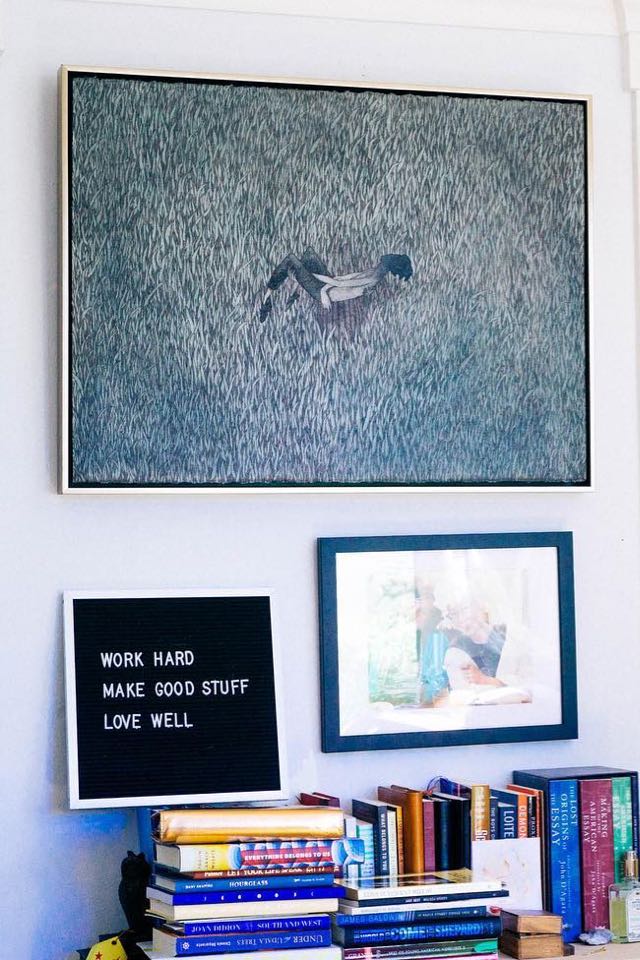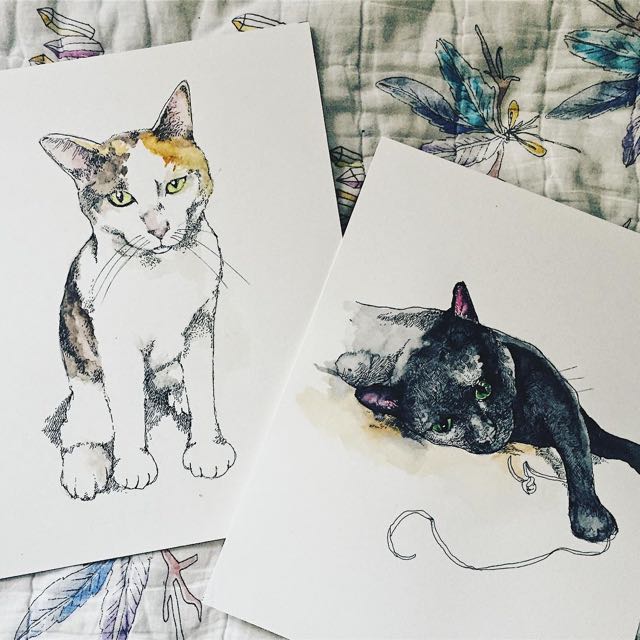An Interview with Esmé Weijun Wang
— feature
Would you mind talking a little about the creative path you’ve taken—you’re known for your nonfiction, but have also released a novel, The Border of Paradise. Were you always interested in the arts?
WangI’ve been writing fiction forever—more seriously since I went to graduate school, but I was the kind of nine-year-old who subscribed to Writer’s Digest and owned a copy of The Market Guide for Young Writers. So writing has always been what I wanted to do, and have been doing.

Are there any texts that have particularly influenced your fiction or nonfiction writing?
WangOh, of course! Too many to name. And different works have different types of influence on my writing, or particularly influence particular pieces of writing. Old standards such as The Sound and the Fury, Lolita, Moby Dick, and Flannery O’Connor were always close at hand when I wrote The Border of Paradise. I’ve had other books around while working on The Collected Schizophrenias: The Noonday Demon; Dani Shapiro’s new book, Hourglass; Notes from No Man’s Land; Dear Friend, From My Life I Write to You in Your Life. But I’m influenced by things all the time. It all goes into the hopper.
wildness
How do you go about researching your nonfiction and fiction; is their a fundamental difference between the two fields to you? what are the crossovers?
WangResearch forms the backbone of my nonfiction in a different way than it does for fiction. Another way to talk about this—nonfiction is, for me, a much more left-brained activity. I have a gray metal box full of index cards that make up The Collected Schizophrenias, and when I need to work on an essay, the index cards are spread out all over the floor; I move them to see where the gaps are. Writing fiction is a much more dreamy process, in comparison. I wander around a lot with fiction.
wildness
Your characters are all beautifully crafted, and really work towards what you call a “reflection of one another’s experiences”. How did you round out the individual characters within The Border of Paradise?
WangI got to know the characters in The Border of Paradise really, really well, in part because I’d created structural circumstances in which I was writing from six different perspectives. Their voices needed to be distinct; having distinct voices made it easier to slip into their skins. I’d fall asleep at night and dream as Gillian. Sometimes I’d have mental conversations with the Nowak family about how the manuscript was faring.
wildness
In the novel, your love of language—not only the written but the physical—is evident. Jia-Hui Chen talks of her verbal paralysis (“the vaguest language space”), and, in a previous discussion, you commented “I find it really interesting to think about how much of a relationship is dependent on wordlessness.” Did you enjoy exploring this in the novel?
WangProse stylings are important to me, and might not be as important to me in the future, but I’ve always been captivated by, and tried to write, beautiful prose. So I enjoyed trying to write prose that I would enjoy as a reader, while also getting to experiment with using language in different ways, such as using blank spaces or using Chinese characters in place of, or alongside, pinyin.
wildness
References to dreams and hallucinations litter the novel; how important was it to explore the fine line that exists between the internal and external? Also, you’ve talked before about your own experienced delusions, was it critical to show these elements as honestly as possible?
WangWriting the internal was one of the driving forces behind The Border of Paradise. Right before I started working on the book in earnest, I read Anna Karenina for the first time, and found it thrilling to experience how Tolstoy writes psychology, how people think. I wanted to take on the challenge of rendering certain psychological, internal experiences in ways I hadn’t seen before in literature. The scene where David hallucinates in the woods is one of those—I’d never before read a scene involving a psychotic hallucination that read as though the writer had experienced one, so I tried my hand at it.
wildness
Whilst the ‘depressed writer’ is a crude trope, is the “fear of losing [your] capabilities” something that works into your creativity, or something that works against it? Could you talk a little about the correlation between creativity and healing?
Wang
As someone who lives with chronic mental and physical illness, I’m always afraid of becoming too ill to do any sort of work, including writing. There’s a line, I think, where a little bit of disorder can stimulate writing—cross that line, and it’s nothing but a mess. In dealing, particularly, with disabling chronic illness, I’ve needed to figure out different ways of healing in order to allow for writing.
Journaling is, for me, a loose form of writing. Anything goes. And I am an avid journal-keeper. I built an online class based on the concept of “restorative journaling,” called Rawness of Remembering, that hundreds of people have taken; what I teach in that class are skills that I’ve developed through years of journaling as a healing tool.
wildness
“Keep going, you’re doing great” is a personal mantra of yours. If you are able, how do you keep this feeling sparked within your creative life? and your life in general?
WangI’m delighted that you picked up on that. It’s a mantra that I keep close to my heart. To keep the feeling alive, I treat it like any other mantra: I repeat it often. I share it with others.
wildness
The Border of Paradise is set between Taiwan and the east and west coasts’ of America; obviously location is important to you, but in what ways does it affect you personally, and, as a result, the work you produce?
WangI don’t tend to travel much, largely due to illness. 2017 has been an unusual year in that regard—I’ve been all over the place for work. But in terms of my writing, and with The Border of Paradise in particular, I marinate in places so that I might be able to write about them later. I have these files—I call them “electricity notebooks”—where I jot down details about things and places that light me up in some way. If there’s a certain frisson, a thrill, about those details, they’ll eventually find a place in my writing.
wildness
What does a typical day look like for you? (If there is such a thing.)
WangMy days are fairly structured. I wake up at around four or five, sometimes earlier. I take my medication, wash up, make coffee, and do my morning journaling for the day. The way I journal in the mornings is generally the same—a prayer of gratitude, etc. I look at my projects and tasks and assign myself work for the day.
Before I start working, and after the journaling, I read for at least half an hour. Right now I’m rereading Sylvia Plath’s journals. I didn’t realize until recently that I’m older than Plath was when she died. That’s a strange thing about icons and death.
I generally work until about 3 or 4, and then I start to wind down. My husband comes home in the late afternoon, so we’re able to spend a few hours together before I go to bed early.
wildness
Would you mind telling us what you’re working on at the moment? You appear to focus on several projects, do you find yourself consciously split between them?
WangI’m always dividing my time between writing and working on and in my online business, The Unexpected Shape, which provides resources for ambitious people living with limitations. This is the simplest way of looking at what I’m working on.
More specifically, I’m working on a collection of essays about schizophrenia that’s coming out with Graywolf Press next year, called The Collected Schizophrenias. For The Unexpected Shape, I’m doing a trial run of commissioned pet portraits, and finalizing a free workbook on productivity journaling that’ll soon go out to people subscribed to my newsletter.
There are also a million smaller projects and responsibilities going on at any given time. I try to stay as organized as possible for this reason.
wildness
What are you reading at the moment?
WangBesides rereading Plath’s journals, I’m also reading a bunch of other things—I need to slow down and narrow the scope so that I can focus on one or two of them. I’m reading my old friend Jenny Zhang’s debut short story collection, Sour Heart, which is coming out later this year. A collection of short stories from her is something I’ve been looking forward to for over a decade, so to have a galley is truly exciting. I’m also reading Arcadia, by Lauren Groff; I recently got to know her through the Granta list and its ensuing events, and I love her prose. Arcadia makes me glad that I wasn’t born in the time of hippies.
Read more from Issue No. 9 or share on Twitter.